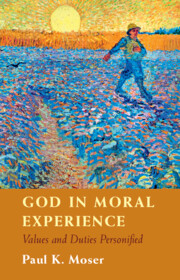Book contents
- God in Moral Experience
- God in Moral Experience
- Copyright page
- Contents
- Preface
- Introduction
- 1 Moral Experience and Persons
- 2 Moral Experience and God
- 3 Moral Experience and Moral Rapport
- 4 Moral Experience and Moral Inspiration
- 5 Moral Experience without Philosophical Overlays
- 6 Moral Experience and Co-valuing in Conflict
- 7 Moral Experience Justified by God
- 8 Moral Experience and Theological Inquiry
- Select Bibliography
- Index
5 - Moral Experience without Philosophical Overlays
Published online by Cambridge University Press: 09 November 2023
- God in Moral Experience
- God in Moral Experience
- Copyright page
- Contents
- Preface
- Introduction
- 1 Moral Experience and Persons
- 2 Moral Experience and God
- 3 Moral Experience and Moral Rapport
- 4 Moral Experience and Moral Inspiration
- 5 Moral Experience without Philosophical Overlays
- 6 Moral Experience and Co-valuing in Conflict
- 7 Moral Experience Justified by God
- 8 Moral Experience and Theological Inquiry
- Select Bibliography
- Index
Summary
Many philosophers and theologians hold that evidence for God’s reality and goodness from human experience, including moral experience, is inadequate for reasonable belief. They thus try to add credibility to faith in God by means of persuasive philosophical arguments and explanations. There are two main ways to pursue this aim, and one way is arguably more effective and defensible than the other, at least from the epistemological perspective of the Apostle Paul. Philosophers and theologians who hold that Paul has a contribution to make in this area should consider the relative efficacy of these two ways. The key area of contrast lies in the epistemic basis of relevant philosophical arguments and explanations: either a basis in the power of direct divine self-manifestation or a basis just in philosophical claims. The latter basis will neglect or obscure the power that is distinctive of the prominent biblical God and thus miss out on the foundational evidence characteristic of that God.
- Type
- Chapter
- Information
- God in Moral ExperienceValues and Duties Personified, pp. 121 - 147Publisher: Cambridge University PressPrint publication year: 2023

